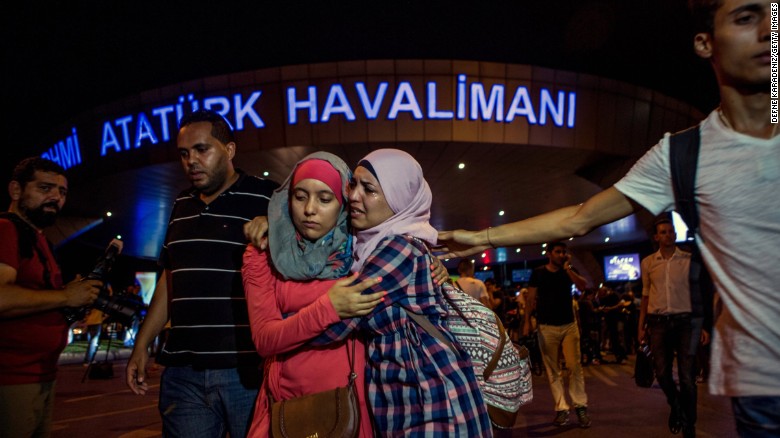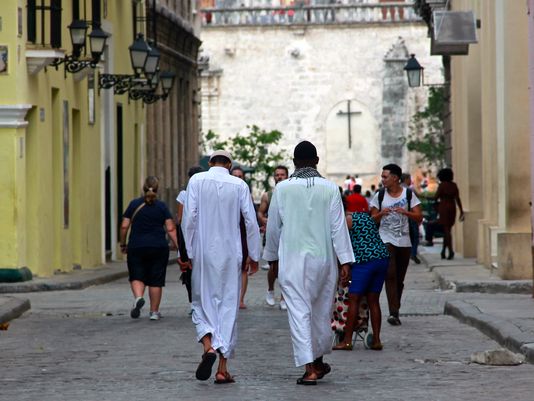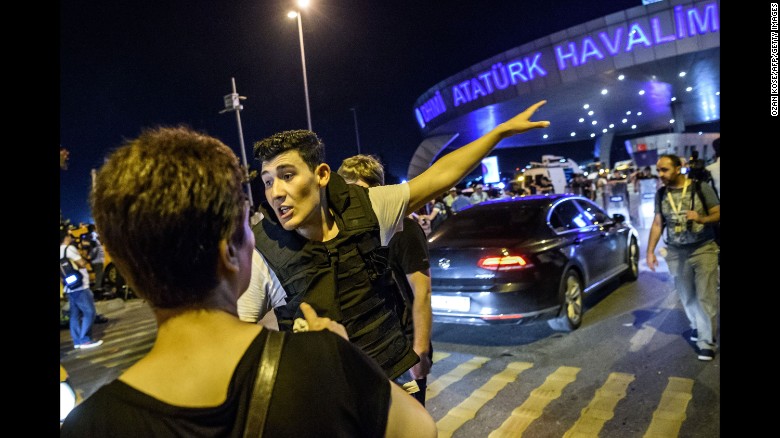With all the stories on the Internet it can be difficult to always stay in the know. To help, we’ve searched the web for interesting pieces of news, videos and tips to help you start off your week on the right foot.
1. Why we forget Muslim terror victims

People flee the scene of a terror attack at Istanbul’s Ataturk airport on Tuesday June, 28. Three terrorists armed with bombs and guns attacked the main international terminal, opening fire and eventually detonating their devices. Defne Karadeniz / Getty Images
Columnist Haroon Moghul talks about the lack of global outrage after a bombing at Istanbul’s Ataturk airport, last week, killed 42 people and injured hundreds.
He goes on to write how some Muslims think the absence of public support when the victims are Muslim is a double standard and a clear indicator of Islamophobia. However, he says he’s not sure if he agrees.
“What’s happening here has more to do with what we know about Muslims, what we don’t know about Muslims and what we would prefer not to know about Muslims,” Mogul writes. “It’s harder to accept facts that force you to discuss your own complicity in another nation’s implosion.”
Mogul also writes about how people, inherently, look to and care about places that most reflect themselves.
“We care more for places we know, and for people like us,” Mogul writes. “We dismiss places we don’t. And that reflects how power works in the world.”
[tweetthis]Columnist Haroon Moghul writes about how it’s “harder to accept facts that force you to discuss your own complicity in another nation’s implosion.”[/tweetthis]
2. New trial granted for Adnan Syed, subject of ‘Serial’ podcast
A judge has ordered a new trial for 36-year-old Adnan Syed, the Baltimore man convicted of murdering his ex-girlfriend. His case made headlines after becoming the center of the popular podcast “Serial” last year.
“This is an incredible victory,” Justin Brown, Syed’s attorney, said. “We have been fighting for this day for about eight years now. It’s been a grueling fight and there have been a lot of disappointments along the way and there were times when it looked like we lost, but we’ve made it and we got him a new trial.”
Syed has been serving a life sentence since 2000, when he was convicted of killing Hae Min Lee, his classmate and ex-girlfriend at Woodlawn High School in Baltimore.
3. Samantha Bee talked to American Muslims and found out they’re … normal
Late night hostess and comedian Samantha Bee, in a recent segment of her show Full Frontal With Samantha Bee, travels to Dearborn, Michigan where the highest Muslim population in America is.
Bee travels to investigate why this Muslim community isn’t doing more to turn in terrorists and stop attacks, as so many political entities assert is happening.
Throughout their interview, Bee continues to ask Ali what they do to catch extremists in their community.
“There have been instances where we were concerned about someone but they didn’t really pan out,” Ali told Bee. “When we find these terrorist we will turn them in. Sorry to disappoint you and many others but the reality is that Muslims are doing their share. We are addressing community issues like any other community would.”
[tweetthis]Late night hostess and comedian Samantha Bee travels to Dearborn to discover that American Muslim are completely normal.[/tweetthis]
4. Turning Egypt’s trash into fabric
Two designers in Egypt have created a process which utilizes waste by combining plastic bags and recycled cotton to make a fabric they call “Plastex.”
5. Islam thrives in communist Cuba

Ahmed Abuero (right) walks the streets of Old Havana with a Cuban Muslim convert, Ahmed, on June 22, 2016. Kamilia Lahrichi / Special for USA TODAY
In a small but lively community in Cuba about 10,000 —based on their own estimate —Muslims are blending Islamic values and Latin American customs. On an island more associated with Catholicism and Santeria, the little community has started holding their daily prayers inside Cuba’s first mosque that opened around this time last year thanks to funding from Turkey’s president Recep Erdoğan.
“Islam has been important in Cuban culture since the arrival of Christopher Columbus to the island,” Marta Linares Gonzalez told USA Today. Gonzalez converted to Islam and has since changed his name to the Islamic name Fatima. “He came with Moorish slaves, who are part of the Spanish culture.”
The mosque is located in Old Havana and sits next to an Islamic museum, known as The Arab House, which has brand new Spanish-Arabic copies of the Qur’an .
According to members of the mosque the Muslim population has grown because of students who travel to Cuba from Chad, Niger, Nigeria and Rwanda. But even with the slow stream of immigration most Muslims in Cuba are converts.
“It was difficult at the beginning because I had to stop drinking alcohol, seeing women, playing, eating pork and drinking rum, things every Cuban does,” Ahmed Abuero, the mosque’s religious leader said. “The night I converted to Islam, I could not sleep. I knew the following day my life would change forever.”
[tweetthis]altM’s weekly roundup of news[/tweetthis]
This list was curated by Kaitlin Montgomery, altM News Editor




